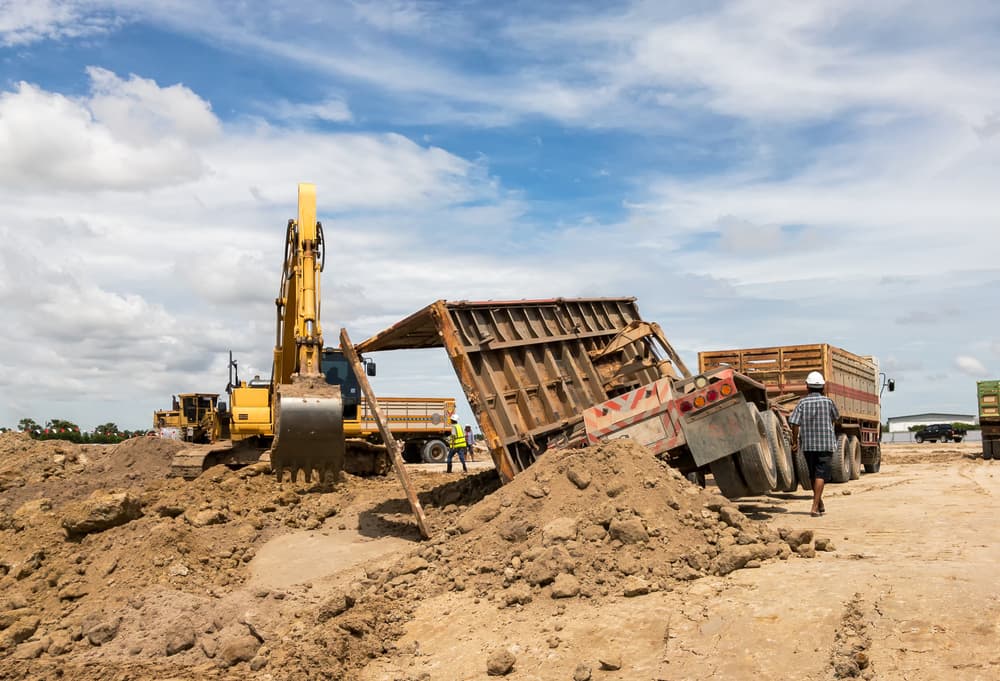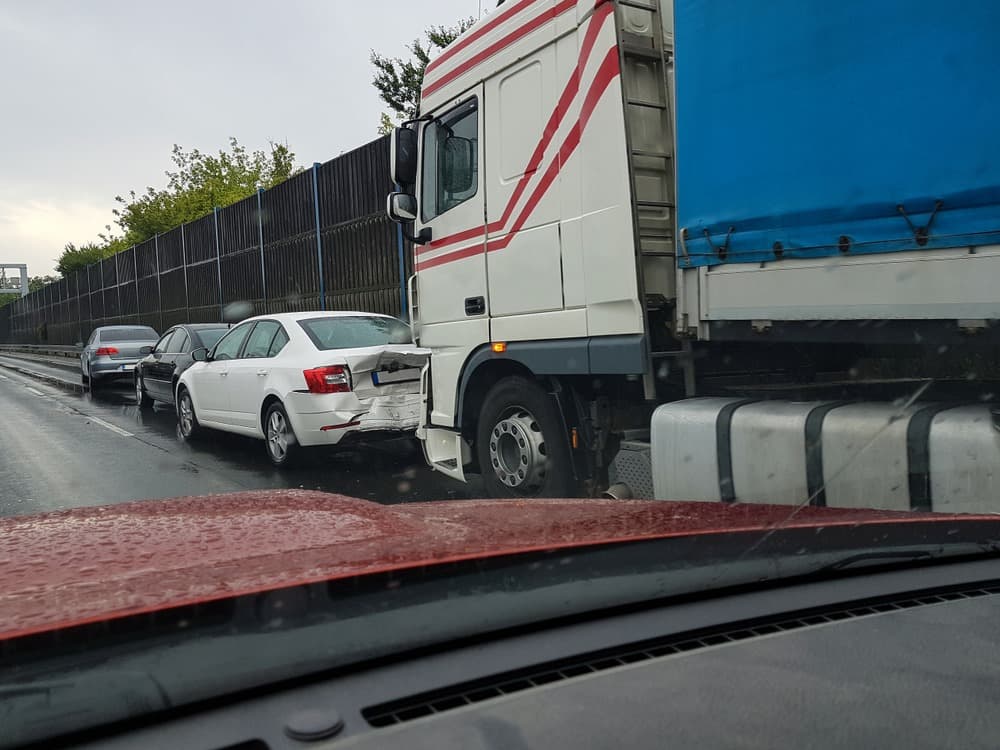Rear-end truck accidents have particularly devastating consequences due to the size and weight of commercial vehicles. These collisions cause severe injuries, extensive property damage, and even death.
If you or a loved one has been involved in a rear-end truck accident, it is crucial to understand your rights and legal options. Reach out a seasoned truck accident attorney immediately for legal assistance.
What Causes Rear-End Truck Accidents?
Distracted Driving

Texting, talking on the phone, multitasking, and other distracted driving habits are a leading cause of rear-end truck accidents. While strict federal regulations limit the use of handheld devices while operating large trucks, unfortunately, these rules are not always followed.
Some states, like Wisconsin, Minnesota, and North Dakota, have laws that consider distracted driving a form of negligence, which means the truck driver may be liable for any damages caused by their distraction.
Fatigued Driving
Truck drivers are under pressure to meet tight delivery deadlines, leading them to drive long hours without proper rest. This results in driver fatigue, significantly increasing the risk of rear-end accidents.
The Federal Motor Carrier Safety Administration (FMCSA) has strict regulations to prevent driver fatigue.
For example, Wisconsin truck drivers must take a 30-minute break after eight consecutive hours of driving. If a driver exceeded driving time without a break, you can hold them or the trucking company they work for liable.
Speeding

Traveling at excessive speeds dramatically increases the chances of a rear-end truck accident. The impact of a truck traveling at high speeds can cause catastrophic damage to other vehicles and their passengers, resulting in severe injuries or fatalities.
In addition to being dangerous, speeding is against federal regulations for commercial truck drivers. If a truck driver broke the speed limit and caused an accident, they may be responsible for any damages.
Impaired Driving
Driving under the influence of drugs or alcohol is a common cause of rear-end truck collisions. The size and weight of commercial trucks make it difficult for drivers to navigate safely, even when sober. Adding intoxication to the mix increases the chances of a severe accident occurring.
Intoxicated truck drivers may face criminal charges, but they can also be liable in a civil lawsuit for any damages caused by their impaired driving. Furthermore, the trucking company may also be responsible if it fails to screen or monitor its drivers properly.
Inclement Weather

Poor weather conditions, such as rain, snow, or fog, can significantly impact a truck driver's visibility and ability to maneuver their vehicle. This increases the risk of rear-end accidents on the road. Truck drivers are expected to exercise caution and adjust their driving according to the weather conditions.
However, if a truck driver fails to do so and causes an accident due to poor weather conditions, they may be found at fault for any resulting damages. Additionally, the municipality responsible for maintaining safe road conditions may be liable if it was negligent in its duties.
Poor Road Conditions
Poor road conditions, from large potholes to lack of signage, contribute to rear-end truck accidents. Commercial trucks are already difficult to navigate and control, so the risk of accidents significantly increases when combined with hazardous road conditions.
In these cases, the municipality responsible for maintaining safe roads may be liable for any damages caused by its negligence. Additionally, if poor maintenance or faulty equipment played a role in the accident, the trucking company, parts manufacturer, or mechanic may also be financially responsible for damages.
Where Do Rear-End Truck Accidents Happen?
Intersections
Intersections across the USA are the most common locations for rear-end truck accidents. These accidents can result in serious injuries and fatalities if a truck driver fails to stop at a red light, does not follow proper right-of-way rules, or drives too fast for the road conditions.
Highways
Rear-end truck crashes occur frequently on highways due to speeding, distracted driving, unsafe lane changes, and fatigue. The high speeds and heavy traffic make these accidents particularly dangerous, often resulting in catastrophic outcomes.
Construction Zones

It is easy to forget that construction zones are active work sites with fast-moving vehicles. When truck drivers fail to slow down or follow proper construction zone procedures, they put themselves and others at risk for a rear-end accident.
Conversely, moving vehicles can rear-end stationary objects such as construction equipment, especially when the site lacks proper warning signs.
Parking Lots
Commercial trucks go in and out of parking lots to deliver goods to businesses every day. However, these lots are often tight spaces with multiple vehicles and pedestrians present. Truck drivers who are not paying attention or driving recklessly can easily cause a rear-end accident.
Residential Areas
Municipal and commercial trucks frequently stop and turn in residential areas, which increases the risk of rear-end accidents due to their size and difficulty maneuvering. Add distractions from parked cars, pedestrians, and children playing, and the potential for accidents escalates.
Rear-End Truck Accident Injuries
Head and Neck Injuries
Head and neck injuries are common in rear-end truck collisions due to the significant impact and abrupt movement of the vehicle being hit.
Typical head and neck injuries sustained include:
- Whiplash
- Concussions
- Traumatic brain injuries (TBIs)
Of these head and neck injuries, TBIs are the most severe. They can lead to long-term cognitive impairment and require extensive medical treatment. Whiplash often presents itself as a minor injury, but delayed symptoms can result in chronic pain, lost earning potential, and years of expensive physical therapy.
Spinal Cord Injuries
Rear-end truck accidents can cause spinal cord injuries, which can lead to partial or complete paralysis. These types of injuries require extensive medical treatment and ongoing care, resulting in a significant financial burden for the victim and their family.
Common spinal cord injuries from rear-end truck crashes include:
- Herniated discs
- Fractures or breaks in the vertebrae
- Nerve damage
When these injuries lead to paraplegia or quadriplegia, the victim may lose their ability to work and require lifelong assistance with daily tasks. Upfront costs for paralysis treatment often exceed $300,000 and can total more than $3 million over a lifetime.
Broken Bones
High-speed rear-end truck crashes can cause severe trauma, resulting in broken bones. These injuries may require surgery and lengthy rehabilitation, causing the victim to miss work and incur significant medical expenses.
Common broken bones from rear-end truck accidents include:
- Arms or legs
- Fingers or toes
- Rib fractures
- Facial fractures
Facial fracture injuries can be particularly devastating, requiring costly reconstructive surgery and potentially causing disfigurement and emotional distress for the victim. On average, the cost of a facial fracture injury can range from $3,000 to $25,000.
PTSD
Many studies highlight the high frequency of PTSD (Post Traumatic Stress Disorder) resulting from rear-end truck collisions. The sudden impact, loud noises, and long-term consequences can have a significant psychological effect on the victims and their loved ones. PTSD includes flashbacks, anxiety, depression, and difficulty sleeping.
In severe rear-end accidents, victims may develop amaxophobia or the fear of driving. This can significantly impact their daily lives and require costly psychological treatment that reaches tens of thousands over a lifetime.
Who Is at Fault in a Rear-End Truck Accident?
The rear driver is usually presumed to be at fault for failing to maintain a safe distance and follow traffic laws.
However, there are exceptions to this presumption, such as:
- The front driver's brake lights failed to function properly
- The front driver suddenly and unexpectedly stopped for no reason
- Poor road conditions not related to negligent maintenance
- The front driver made a sudden and illegal lane change
- The front driver was intoxicated or under the influence of drugs
- The front car was in Reverse gear without warning
Depending on your state, these and many other factors can affect the outcome or your right to file a personal injury claim for a truck accident. To ensure your rights are protected and you receive fair compensation for your damages, it is crucial to consult an experienced truck accident attorney.
How Do I File an Insurance Claim After a Rear-End Truck Collision?
The best way to deal with insurance after a truck accident is to hire an experienced personal injury lawyer to guide you through the claims process. Every state has a different process and set of laws regarding truck accidents, so hiring an experienced accident attorney is crucial to filing correctly.
For example, Minnesota and North Dakota are no-fault states. This means each driver often files an initial claim with their insurance company, regardless of who caused the accident in order to access PIP benefits.
If state-mandated PIP (Personal Injury Protection) insurance is insufficient to cover all your damages, you may be able to seek compensation from the other driver's insurance company with the help of a lawyer.
Wisconsin and many other states follow a general tort or at-fault system. This means the at-fault driver, negligent party, or insurance company is responsible for paying damages. In these states, you must prove the other driver's negligence caused your injuries and subsequent damages.
In both cases, insurance companies will try to minimize the extent of your injuries and offer lower settlements.
However, considering the long-term medical costs, lost earning potential, and emotional distress rear-end truck crashes cause, you can't afford to accept anything less than a fair settlement for your injuries. With the help of a personal injury lawyer, you can ensure full, fair compensation for damages.
Rear End Truck Accidents Do's and Don'ts
DO seek medical attention, even if you don't feel injured immediately.
Injuries unique to rear-end collisions often result in delayed symptoms. Seeing a doctor immediately after the accident can help detect and document injuries before they worsen, making them easier to prove in a truck accident claim.
It will also allow you to begin treatment and prevent long-term complications that increase your financial burdens and suffering.
DO gather evidence at the scene, if possible.
Taking photos of the accident scene, the damage to both vehicles, and any visible injuries can help support your case later on. It is also essential to collect contact information from witnesses and obtain a copy of the police report.
If you are severely injured in a rear-end accident, your lawyer can help gather evidence on your behalf.
DO NOT settle with the other driver at the accident.
Some drivers may try to convince you to settle the matter privately without involving insurance or legal action. This red flag can result in being under-compensated for your injuries and damages.
Additionally, not making an official report severely hinders your chances of receiving proper compensation for future medical expenses.
DO consult with a personal injury lawyer as soon as possible.
A skilled truck accident attorney can help determine fault, navigate the complex legal process, and ensure you receive fair compensation for your injuries and damages. They can also protect your rights and handle communications with insurance companies on your behalf.
DO NOT delay in taking legal action.
Depending on the state, there may be a limited time frame, known as the statute of limitations, within which you can file a personal injury claim for a rear-end truck accident. These time limits range from two to six years.
However, the statute of limitations may vary depending on the severity or circumstances of the accident. For example, wrongful death, collisions with city vehicles, and hit-and-run accidents may have different limitations.
DO NOT sign anything without consulting a lawyer first.
Insurance companies may offer you a quick settlement much lower than you are entitled to receive. Before signing anything, it is crucial to have a lawyer review the documents and ensure your rights are protected.
Protect Your Right to Compensation After Your Rear-End Truck Accident
You may not be able to protect yourself from being the victim of a rear-end truck accident. However, understanding the unique circumstances of these accidents means you can protect your rights and receive fair compensation for your injuries.
Remember, there's no time to wait when seeking justice for accident injuries. Contact a Minnesota personal injury law firm for your free case evaluation today.
